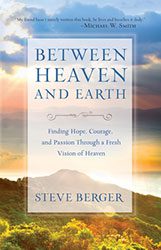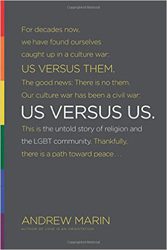 Steve Berger, pastor and author of the new book Between Heaven and Earth, is heaven-obsessed. In light of his own family’s tragedies and the imperfections of human life, he sees heaven as his true home and the hope of heaven shapes his every decision. For Berger, the hope of heaven gives him a larger perspective. The challenges and ambitions of this lifetime are penultimate, and pale in comparison to our heavenly destiny, yet are part of our heavenly destiny inspiring us to make good decisions, get our priorities in order, and reach out to others for Christ. In many ways, I agree with Berger, despite a very different understanding of heaven and the scriptures upon which he bases his vision of heaven. It is important to see our lives in a larger perspective, to recognize that this moment is part of a larger adventure, and that while every decision is important, none is all-important.
Steve Berger, pastor and author of the new book Between Heaven and Earth, is heaven-obsessed. In light of his own family’s tragedies and the imperfections of human life, he sees heaven as his true home and the hope of heaven shapes his every decision. For Berger, the hope of heaven gives him a larger perspective. The challenges and ambitions of this lifetime are penultimate, and pale in comparison to our heavenly destiny, yet are part of our heavenly destiny inspiring us to make good decisions, get our priorities in order, and reach out to others for Christ. In many ways, I agree with Berger, despite a very different understanding of heaven and the scriptures upon which he bases his vision of heaven. It is important to see our lives in a larger perspective, to recognize that this moment is part of a larger adventure, and that while every decision is important, none is all-important.
Last Sunday, I viewed the premiere episode of Neil Degrasse Tyson’s 21st century version of Cosmos. I was inspired by the vision of a 13.8 billion year cosmic journey and a universe – perhaps one of many – of more than one hundred billion galaxies, like our Milky Way. The grandeur of the universe puts our lives in perspective: we discover how small we are as finite creatures on a small planet hurtling in space.
Such feelings of grandeur, bounding on the mystical, are at the heart of religious experience. We can experience this vision in the words of Psalm 8:
When I look at your heavens, the work of your fingers,
the moon and the stars that you have established;
what are human beings that you are mindful of them,
mortals that you care for them?
The Psalmist affirms two things: the universe is awesome and so is its creator. Our lives are part of a larger cosmic adventure, guided by wise and creative God. Such words might have inspired the Jewish proverb: everyone should have a card in each pocket, the first reading “for you the universe was made,” the second asserting, “you are dust.” We are dusty “star stuff,” to elaborate on both Carl Sagan and Neil Degrasse Tyson. The grandeur of the universe relativizes every task and counsels us to “chill out” when we obsess over small things, acting as if our lives or the world depend upon them.
The Psalmist is awestruck, but he also recognizes that the creator God is present everywhere and has centered divine love on us. Or, as one scientist affirmed, in a decentered universe, described by today’s cosmologist, every place is the center. The Psalmist exclaims in awe, noting divine revelation in small and large:
Yet you have made them [humankind] a little lower than God,
and crowned them with glory and honor.
We are dust and we are the objects of divine care for whom the universe was made. (I will add that our uniqueness is only helpful if we realize that God centers all things, both human and non-human, on Earth and throughout the cosmos.)
The immensity of the universe gives us perspective and invites us to have a spirit of committed detachment, letting go when necessary, of the tasks that occupy our attention.
Our visions of the afterlife also inspire a sense of perspective, inspiring and relativizing our most beloved projects. The afterlife inspires us because its reality reminds us that our lives are part of a larger adventure in which we are creating, in partnership with God, our own and others’ afterlives in the here and now. If our personality continues after death, our experiences will also continue and be the materials from which our afterlives emerge. If we give God and others a beautiful world today, we are contributing to the quality of their postmortem lives.
Ethics in light of immortality involves the affirmation that this world is holy, and God is ever-present in our lives. Accordingly, in some ways, God is no more present in heaven than on Earth. Yet, in light of immortality or everlasting life, we can affirm ongoing adventures in a world in which the external distractions and temptations, our own, others’ and our world’s imperfections, will no longer get in the way of our spiritual evolution.
Finally, and I say this in passing, I affirm that everyone is given opportunities to share in God’s postmortem adventures. The idea of everlasting “hell” is the ultimate challenge to God: it implies that imperfection (sin) and death are stronger than either God’s power, love, or both. It implies that God will not or cannot save or embrace people beyond the hour of death: God’s patience and power is too weak or God’s love too conditional. Given our growing understanding of the interdependence of life, the significance of environment and genetics in shaping our destinies, and the impact of family of origin on long-term well-being, we can no longer see issues of salvation or damnation as individualistic in nature: while we are decision-makers, our decisions are radically influenced by factors beyond ourselves. Accordingly, accepting Christ as our savior is a matter of decision and grace, and it is also a matter of genetics, environment, and family influence. Surely God’s grace takes into account the interdependence of life, and God’s power and love extend far beyond the grave not just for a select group of Christians but all of God’s beloved children. Such a vision gives us hope and courage for living on this good Earth.
Read an excerpt from Between Heaven and Earth at the Patheos Book Club here.













